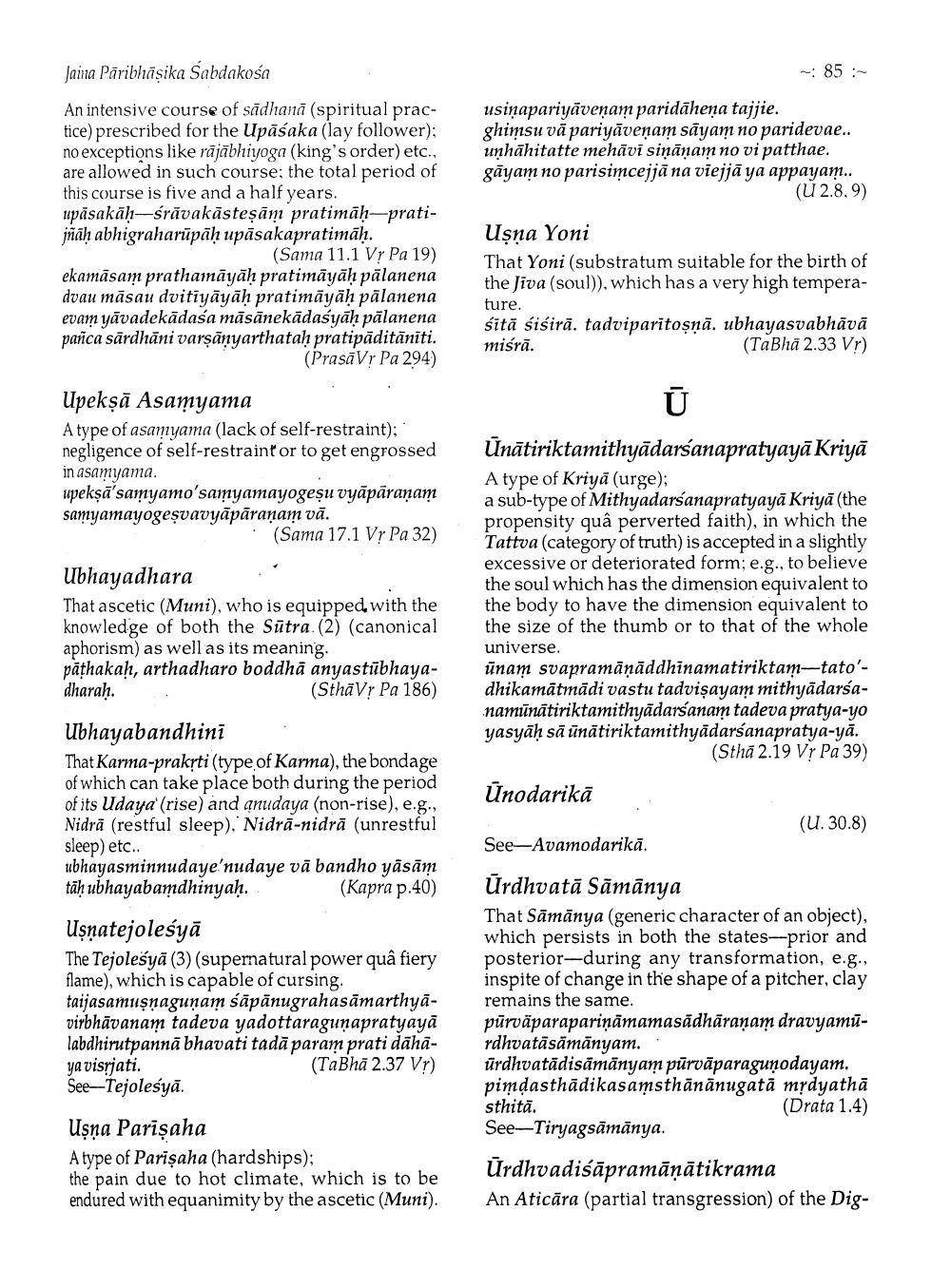________________
Jaina Pāribhāsika Sabdakosa
- 85:
usiņapariyāveņam paridāhena tajjie. ghimsu vā pariyāveņam sāyam no paridevae.. unhāhitatte mehāvi siņānam no vi patthae. gāyam no parisimcejjā na viejjā ya appayam..
(U 2.8.9)
An intensive course of sādhanā (spiritual practice) prescribed for the Upāśaka (lay follower); no exceptions like rājābhiyoga (king's order) etc., are allowed in such course: the total period of this course is five and a half years. upāsakāh--srāvakāsteṣām pratimāḥ-pratijñāḥ abhigraharūpāh upāsakapratimā”.
(Sama 11.1 Vr Pa 19) ekamāsam prathamāyāḥ pratimāyāḥ pālanena dvau māsau dvitiyāyāḥ pratimāyān pālanena evam yāvadekādasa māsānekādasyān pālanena panca sārdhāni varşanyarthatah pratipăditāniti.
(Prasā Vr Pa 294)
Usna Yoni That Yoni (substratum suitable for the birth of the Jiva (soul)), which has a very high temperature. sitā sisirā. tadviparitosnā. ubhayasvabhāvā misrā.
(TaBhā 2.33 Vr)
Upekṣā Asamyama A type of asamyama (lack of self-restraint); negligence of self-restraint or to get engrossed in asamyama. upekṣā'samyamo'samyamayogeșu vyāpāraṇam samyamayogeșvavyāpāraṇam vā.
(Sama 17.1 V? Pa 32)
Ubhayadhara That ascetic (Muni), who is equipped with the knowledge of both the Sūtra (2) (canonical aphorism) as well as its meaning. păthakah, arthadharo boddha anyastübhayadharaḥ.
(SthāVr Pa 186)
Unātiriktamithyādarśanapratyayā Kriyā A type of Kriyā (urge); a sub-type of Mithyadarsanapratyayā Kriyā (the propensity quâ perverted faith), in which the Tattva (category of truth) is accepted in a slightly excessive or deteriorated form; e.g., to believe the soul which has the dimension equivalent to the body to have the dimension equivalent to the size of the thumb or to that of the whole universe. ūnam svapramāņāddhinamatiriktam-tato'dhikamātmādi vastu tadvişayam mithyādarsanamūnātiriktamithyādarsanam tadeva pratya-yo yasyāḥ sāūnātiriktamithyādarsanapratya-yā.
(Sthā 2.19 Vr Pa 39)
ūnodarikā
Ubhayabandhini That Karma-prakrti (type of Karma), the bondage of which can take place both during the period of its Udaya' (rise) and anudaya (non-rise), e.g., Nidrā (restful sleep), Nidrā-nidrā (unrestful sleep) etc.. ubhayasminnudaye'nudaye vā bandho yāsām tāḥ ubhayabamdhinyaḥ.
(Kapra p.40)
(U. 30.8)
See-Avamodarikā.
Uşnatejoleśyā The Tejoleśyā (3) (supernatural power quâ fiery flame), which is capable of cursing. taijasamuşnaguņam sāpānugrahasāmarthyāvirbhāvanam tadeva yadottaraguņapratyayā labdhirutpannā bhavati tadā param prati dāhāya visrjati.
(TaBhā 2.37 Vr) Šee-Tejoleśyā.
ūrdhvatā Sāmānya That Sāmānya (generic character of an object), which persists in both the states--prior and posterior--during any transformation, e.g., inspite of change in the shape of a pitcher, clay remains the same. pūrväparapariņāmamasādhāraṇam dravyamūrdhvatāsāmānyam. ürdhvatādisāmānyam pūrvāparaguņodayam. pimdasthādikasamsthānānugată modyathā sthitā.
(Drata 1.4) See-Tiryagsāmānya.
Uşna Parişaha A type of Parişaha (hardships); the pain due to hot climate, which is to be endured with equanimity by the ascetic (Muni).
Urdhvadiśāpramāṇātikrama An Aticāra (partial transgression) of the Dig




